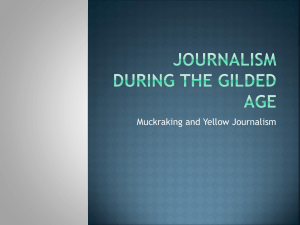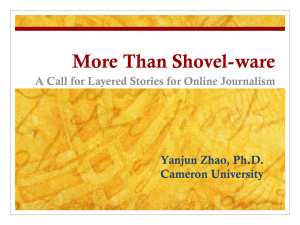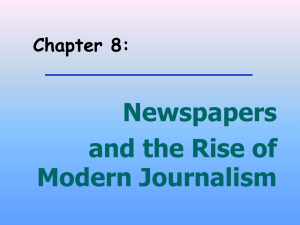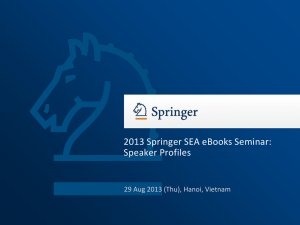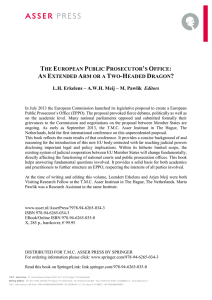Yellow journalism and Axel Springer
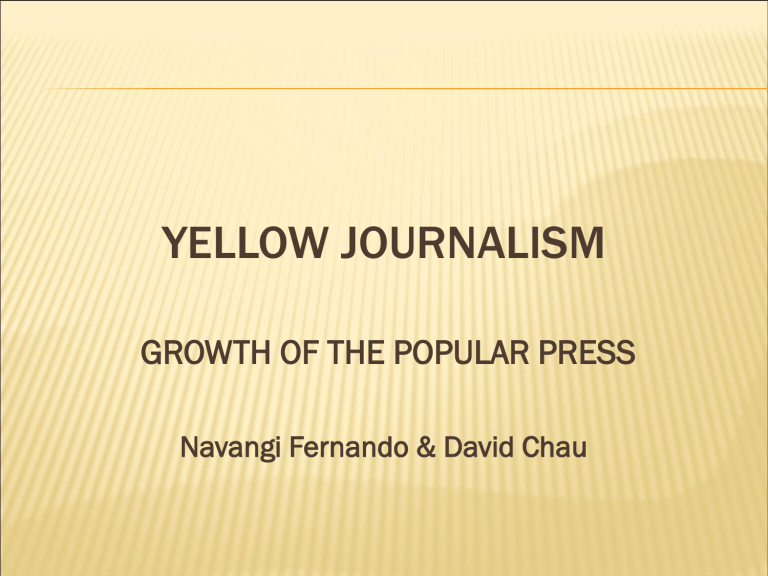
YELLOW JOURNALISM
GROWTH OF THE POPULAR PRESS
Navangi Fernando & David Chau
YELLOW JOURNALISM
Yellow journalism is the use of lurid features and sensationalized news in newspaper publishing to attract readers and increase circulation.
It is a biased opinion masquerading as objective fact. The practice of yellow journalism involved sensationalism, distorted stories, and misleading images for the sole purpose of boosting newspaper sales and exciting public opinion.
It is the reporting of a falsehood as a fact
Journalistic professionalism as we know it now, it the ‘opposite’ of yellow journalism.
Yellow journalism is now often called media bias.
Reported damaging facts about the industry.
Now with near instant media coverage, the lack of care to fact-checking may also be called yellow journalism.
However, these days the accusations of yellow journalism tend to be few.
The onset of rapid industrialisation throughout the world affected the newspaper industry, allowing access if machines that could print thousands of papers in one night.
It is believed that this was a major trigger of yellow journalism – the endless drive for circulation.
In 1898, media was very influential especially in many developed countries.
During that time, it was the editor’s view or interpretation of the view that was printed rather than objective journalism.
With this influence, came power.
Newspapers began to exploit their role by printing very biased, often untrue facts just to get an increase in circulation.
THE NEWSPAPER WAR
This began before the Spanish/American war where William
Randolph Hearst and Joseph Pulitzer, journalist of The New
York Journal and New York World , where fighting for readership in America.
Both journalists saw the war with Spain an ideal subject to exploit. As American patriotism was so high at the time, there was great interest from the public about the happenings in Cuba.
Hearst took special interest in the war, as far to personally edit all articles about it. Similarly, Pulitzer chose to run stories that were very elaborated with very violent details.
These stories played on the fears and loyalties of the
American public.
YELLOW JOURNALISM IN POPULAR CULTURE
In Spiderman , J. Jonah Jameson tries to convince the public that Spiderman is the enemy by printing ‘Spiderman:
Threat or Menace?’
In the James Bond movie Tomorrow
Never Dies , the evil media person tries to start a war between UK and China through sensationalize news stories.
Also in Harry Potter and the Goblet of
Fire , Rita Skeeter acts as a yellow journalist.
LORD AXEL SPRINGER
Axel Springer was born on 2 nd of May, 1912 and was a
German journalist and the founder and owner of the
Axel Springer AG publishing company.
After secondary school, he became an apprentice compositor and printer at the publishers Hammerich
& Lesser-Verlag, his father’s company.
In 1946, he established the Axel Springer Verlag.
Throughout his lifetime, he wrote a couple of books.
During 1968 there is student unrest and there are riots in front of the publishing building in Berlin. There are also attacks on the Hamburg publishing bilding and on Axel Springer’s privet houses.
Shortly after the publishinng company goes public,
Axel Springer dies on 22 September 1985 in Berlin.
ATTACKS AGAINST THE SPRINGER PRESS
He published the Hamburger Abendblatt newspaper as well as some magazines including the popular radio and TV program Hör zu.
In 1952, he started the publication of the tabloid Bild, which became the daily newspaper for millions of
Germans as well as an important influence on the public.
One article in the Bild was titled ‘Eighteen Year-old drank Girls’ Blood’ (in German of course) and was written about a young man who was claimed to have an obsession with vampires. Apparently he was so obsessed that he drank the blood of a girl to satisfy this craze. This wasn’t true but this wasn’t talked about until the boy’s life had been destroyed and he had committed suicide.
Attacks against the Springer Press
Henrich Boll, author of The Lost Honour of
Katharina Blum, disliked Axel Springer especially the way that he manipulated the media. The novel, published in 1975, was a direct attack on the whole Springer organisation. Springer apparently tried to have it banned but it couldn’t be proved that the novel was alluding to the company.
Because of this, Henrich Boll was a frequent target in the paper in the 1970s.



